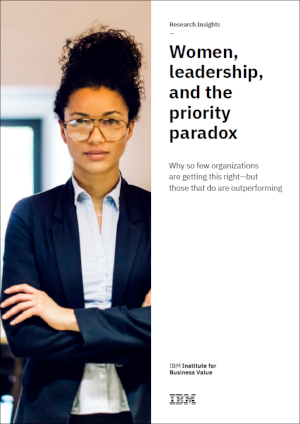Ungated Post | 01 Mar 2019
Women, leadership, and the priority paradox

While women may be in fewer leadership positions worldwide, those organizations with more females at the top outperform their peers.
Oxford Economics worked with IBM’s Institute for Business Value IBV to survey 2,300 executives and professionals – an equal number of women and men – from organizations worldwide across multiple industries to better understand why the gender gap in leadership persists and what can be done to ignite real change.
Respondents included individual C-suite officers (CEOs, CIOs, CFOs, CMOs, COOs, CHROs, and others) as well as senior VPs, VPs, directors, middle managers, and nonmanagerial professionals to capture current leaders’ assessments and assessments from those who could be potential future leaders.
The 10 industries represented included banking, consumer products, education, government, healthcare, insurance, manufacturing, retail, technology, and telecommunications. They each comprise 10% of the total sample. The countries/regions in the survey represent a mix of areas where the gender gap ranges from small to large, according to the World Economic Forum’s Global Gender Gap Report (2017). Each country (or region) comprises 11% of the total
sample.
Our Thought Leadership team produces original, evidence-based research made accessible to decision-makers and opinion leaders.
Oxford Economics’ team is expert at applying advanced economic tools that provide valuable insights into today’s most pressing business, financial, and policy issues.
Related Services

Post
The Economic Footprint of JLR in the UK
This report examines the economic footprint of JLR in the United Kingdom in 2024. The analysis is conducted both at the national level, as well as on the West Midlands and North West regions, where JLR’s main facilities are located.
Find Out More
Post
Airbnb’s Economic Contribution to APAC in 2024: GDP, Jobs, and Regional Impact
Airbnb's platform connects hosts across Asia Pacific (APAC) with travellers from around the world. Oxford Economics was commissioned by Airbnb to quantify its economic footprint in 10 APAC markets in 2024.
Find Out More
Post
Economic Insights: Airbnb’s Contribution Through the Lens of Oxford Economics
Oxford Economics Australia delivered a tailored economic impact assessment for Airbnb, including GDP contribution modelling, job creation analytics, guest‑spend segmentation, and regional tourism dispersion insights to underpin Airbnb’s stakeholder communications and strategic growth initiatives.
Find Out More